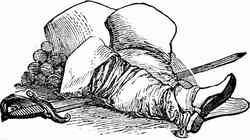Thrilling Incidents In American History
• Preface
Revolutionary War
• Opening Of The Revolution
• The Boston Massacre
• Affair of the Sloop Liberty
• Affair of the Gaspee
• The Tea Riot
• The Boston Port Bill
• The First Continental Congress-Consequent Parliamentary proceedings
• Organization of the Minute-Men
• Patrick Henry-Second Provincial Congress-First Military Enterprise
• Battles of Lexington and Concord
• Battle of Bunker's Hill
• Capture of Ticonderoga
• Second Continental Congress-Washington's Appointment
• Siege of Boston
• Incidents at the Evacuation of Boston
• Burning of Falmouth
• Arnold's Expedition to Quebec
• Siege of Quebec, and Death of Montgomery
• Scenes at Quebec during the Siege
• Expedition against Charleston
• The Declaration of Independence
• The Battle of Long Island
• Washington's Retreat through New Jersey-Capture of General Lee
• Battle of Trenton
• Battle of Princeton
• Capture of General Prescott
• Battle of Brandywine
• Battle of Germantown
• Battle of Red-Bank
• Attack on Fort Mifflin-Retirement of the Army to Valley Forge
• Battle of Bennington
• Murder of Miss M'Crea
• Battle of Stillwater
• Battle of Bemis' Heights, and Retreat of Burgoyne
• Capture of Forts Clinton and Montgomery
• Surrender of Burgoyne
• The Treaty with France
• Attack on Savannah, and Death of Pulaski
• Storming of Stony Point
• General Sullivan's Campaign against the Mohawks
• Tarleton's Quarters
• Battle of Camden, and Death of De Kalb
• Arnold's Treason
• The Loss of the Randolph
• The British Prison-Ships
• Capture of the Serapis
• Putnam's Feat at Horseneck
• Battle of Eutaw Springs
• Wayne's Charge at Green Spring
• Capture of the General Monk
• The Mutinies
• Battle of the Cowpens
• Capture of New London
• Massacre of Wyoming
• Surrender of Cornwallis
War With France
• Capture of L'Insurgente
• The Constellation and Vengeance
War With Tripoli
• Burning of the Philadelphia
• Bombardment of Tripoli
• Loss of the Intrepid
• Expedition of General Eaton
Second War With England
• Battle of Tippecanoe
• Capture of the Guerriere
• Tragical Affair of an Indian Chief
• Battle and Massacre at the River Raisin
• Captain Holmes's Expedition
• Capture of the Caledonia and Detroit
• The Wasp and Frolic
• Gallant Conduct of Lieutenant Allen at the Capture of the Macedonian
• Capture and Destruction of the Java
• Siege of Fort Meigs
• Capture of York, and Death of General Pike
• Defence of Sackett's Harbour
• Defence of Fort Stephenson
• Battle of Lake Erie
• Battle of the Thames
• Gallant Action of Commodore Chauncey under the guns of Kingston Citadel
• The Sacking of Hampton
• Capture of the Peacock
• Massacre at Fort Mimms
• Surrender of Weatherford
• Battle of Niagara
• BattIe of New Orleans
War With Mexico
• Battle of Palo Alto
• Battle of Resaca de la Palma
• Capture of Monterey
• Battle in the Streets of Monterey
• Thrilling Scenes in the Battle of Buena Vista
• Bombardment of Vera Cruz
• Battle of Cerro Gordo
• Battles of Contreras and Churubusco
• Storming of Chapultepec

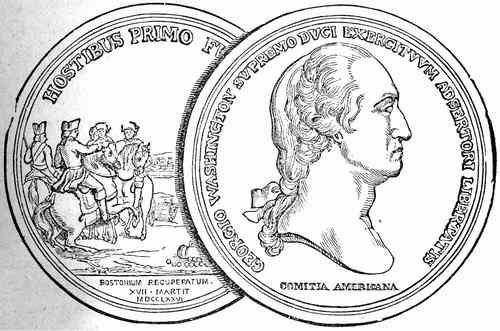
THE BATTLE OF LONG ISLAND.
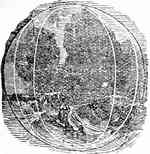 N evacuating Boston, General Howe retired with his forces to Halifax, and
General Washington started for New York, where he soon arrived with
his army. In that city the British interest had been more powerful than in any
other place in the provinces; and the struggle between the friends of British
domination and of American
freedom had been more doubtful there than in any
other quarter. But, by superior numbers and more
daring activity, the adherents of Congress had gained the ascendancy. On his
arrival in the city, General Washington endeavoured to put it into a posture of
defence; and as the British, by means of their fleet, had the command of the
waters, he attempted to obstruct the navigation of the East and North Rivers, by
sinking vessels in the channels. He also raised fortifications at New York, and
on Long Island; and made every preparation in his power for giving the British
army a vigorous reception.
N evacuating Boston, General Howe retired with his forces to Halifax, and
General Washington started for New York, where he soon arrived with
his army. In that city the British interest had been more powerful than in any
other place in the provinces; and the struggle between the friends of British
domination and of American
freedom had been more doubtful there than in any
other quarter. But, by superior numbers and more
daring activity, the adherents of Congress had gained the ascendancy. On his
arrival in the city, General Washington endeavoured to put it into a posture of
defence; and as the British, by means of their fleet, had the command of the
waters, he attempted to obstruct the navigation of the East and North Rivers, by
sinking vessels in the channels. He also raised fortifications at New York, and
on Long Island; and made every preparation in his power for giving the British
army a vigorous reception.
General Howe remained some time at Halifax; but after the recovery of his troops from the fatigue and sickness occasioned by the blockade of Boston, he embarked, sailed to the southward, and on the 2d of July landed, without opposition, on Staten Island, which lies on the coast of New Jersey, and is separated from Long Island by a channel called the Narrows. His army amounted to nine thousand men; and his brother Lord Howe, commander of the British fleet, who had touched at Halifax expecting to find him there, arrived soon afterwards, with a reinforcement of about twenty thousand men from Britain. Thus General Howe had the command of nearly thirty thousand troops, for the purpose of subjugating the American colonies; a more formidable force than had ever before visited these shores. General Washington was ill prepared to meet such a powerful army. His force consisted of about nine thousand men, many of whom were ill-armed, and about two thousand more without any arms at all; but new levies were daily coming in.
On his arrival, Lord Howe, by a flag, sent ashore to Amboy a circular letter to several of the late royal governors, and a declaration mentioning the powers with which he and his brother the general were invested, and desiring their publication. These papers General Washington transmitted to Congress, who ordered them to be published in the newspapers, that the people, as they alleged, might be apprised of the nature and extent of the powers of these commissioners, with the expectation of whom it had been attempted to amuse and disarm them. General Howe wished to open a correspondence with General Washington, but without acknowledging his official character as commander-in-chief of the American armies; and for this purpose he sent a letter to New York; addressed to "George Washington,Esquire." That letter the general refused to receive, because it was not addressed to him in his official character. A second letter was sent, addressed to "George Washington, &c. &c. &c." That also, the general declined to receive; but acted in the most polite manner towards Adjutant-General Paterson, the officer who bore it; who, on his part, behaved himself in a manner becoming his character as a gentleman. Congress approved of the conduct of General Washington on the occasion; and ordered that none of their officers should receive letters of messages from the British army unless addressed to them according to their respective ranks. But this dispute about a point of form was soon succeeded by the din of arms and the horrors of active warfare. The American army was not very formidable. In the month of July, indeed, it amounted to about seventeen thousand men, but a much greater number had been expected; of fifteen thousand new levies, that had been ordered, only five
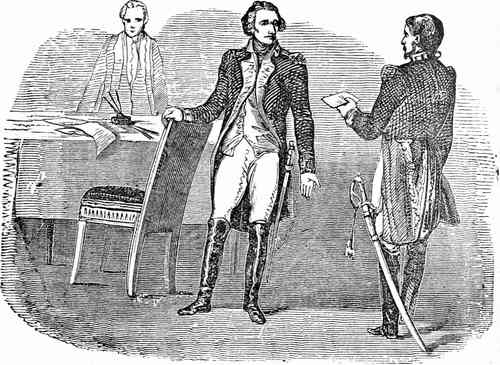
Washington declining Howe's Letter.
thousand had arrived in camp. But the quality and equipment of the troops were more discouraging than their numbers: they were ill-disciplined, ill-armed, and little accustomed to that subordination and prompt obedience, which are essential to the efficiency of an army. They were as deficient in ammunition as in armour; and, instead of being cordially united in the common cause, they were distracted by provincial jealousies, prejudices, and animosities.
This raw and ill-armed multitude was opposed to thirty thousand troops, many of them veterans, all of them excellently equipped, and provided with a fine train of artillery. The Americans soon had the mortification to find that all their endeavours to obstruct the navigation of the rivers were ineffectual; for several British ships-of-war passed up the North River, without receiving any considerable damage from a heavy cannonade directed against them from the shore.
The American army was posted partly at New York, and partly on Long Island. General Greene commanded in the latter place; but that officer being taken ill, General Sullivan was appointed in his room. General Howe, having collected his troops on Staten Island, and finding himself sufficiently strong to commence active operations, on the 22d of August crossed the Narrows without opposition, and landed on Long Island, between two small towns, Utrecht and Gravesend.
The American division on the island, about eleven thousand strong, occupied a fortified camp at Brooklyn, opposite New York. Their right flank was covered by a marsh, which extended to the East River near Mill Creek; their left, by an elbow of the river named Wallabach Bay. Across the peninsula, from Mill Creek to Wallabach Bay, the Americans had thrown up intrenchments, secured by abattis, or felled trees with their tops turned outwards, and flanked by strong redoubts. In their rear was the East River, about thirteen hundred yards wide, separating them from New York. In front of the fortified camp, and at some distance from it, a woody ridge obliquely intersected the island; and through that ridge there are passages by three different defiles-one at the southern extremity near the Narrows, another about the middle on the Flathush road, and a third near the northeast extremity of the hills on the Bedford road. Those defiles General Greene had carefully examined; and as it was evident that the British army must debark on the further side of the ridge, he resolved to dispute the passage of the defiles. General Sullivan, who succeeded to the command on the illness of General Greene, was not equally sensible of the importance of those passes. On the landing of the British, however, he sent strong detachments to guard the passes near. the Narrows, and on the Flathush road; but the more distant pass he did not duly attend to, merely sending an officer with a party to observe it, and give notice if the enemy should appear there. That was no adequate precaution for the security of the pass; and the officer appointed to watch it discharged his duty in the most slovenly manner.
General Howe soon learned that there would be little difficulty in marching by the most distant defile, and turning the left of the Americans. Accordingly, early in the morning of the 27th of August, assisted by Sir Henry Clinton, who had joined him some time before with the troops that had been employed in the unsuccessful attack on Sullivan's Island, he marched with a strong column towards that defile. In order to divert the attention of the Americans from that movement, he ordered Generals Grant and Heister, with their respective divisions, to attack the passes near the Narrows and on the Flathush road. General Grant proceeded to the southernmost defile. The American advanced guard fled on his approach; but the commander of the detachment appointed to guard that pass afterwards occupied an advantageous position and bravely maintained his ground. General Heister, with the Hessians, skirmished on the Flathush road.
While the attention of the Americans was engaged by the operation of those two columns, the main body of the British army proceeded without interruption through the most remote pass; and the American officer appointed to observe that road, performed his duty so ill, that General Howe's column had nearly gained the rear of the American detachment who defended the pass on the Flathush road, before he gave the alarm. That division had hitherto steadily resisted the Hessians; but being apprised of the progress of the hostile column on their left, and being apprehensive of an attack on their rear, they began to retreat. That movement, however, was too late; for they were met by the British who had now gained their rear, and who drove them back on the Hessians, who, in their turn, compelled them to retreat towards the British. Thus they were driven backward and forward between two fires, till, by a desperate effort, the greater part of them forced their way through the British line, and regained their camp.
The division which opposed General Grant fought bravely, and maintained their ground until informed of the defeat of the left wing, when they retreated in confusion; and, in order to avoid the enemy, who were far advanced on their rear, the greater part of them attempted to escape along the dike of a mill-dam, and through a marsh, where many of them perished but a remnant regained the camp. This division suffered severely, and the loss was much regretted, be- cause many young men of the most respectable families in Maryland belonged to it, and fell on the occasion.
The British soldiers behaved with their usual courage, and it was with difficulty that they were restrained from instantly attacking the American camp: but General Howe, who always exercised a laudable care of the lives of his men, checked their impetuosity; perceiving that, without any great loss, he could compel the Americans to surrender, or to evacuate their camp. On that disastrous day the Americans lost two thousand men, in killed, wounded, and prisoners; among the latter were Generals Sullivan, Woodhull, and Alexander, titular Lord Stirling. They also lost six pieces of artillery. The British and Hessians had between three and four hundred men killed or wounded.
To attempt the defence of the islands against an enemy with a triumphant navy was an error in the American plan of the campaign; but the loss of the battle, or at least the easy victory of the British, was owing to the incapacity of General Sullivan. He was full of confidence, and paid no due attention to the more distant pass; but the issue of the day showed him, that confidence was not always the harbinger of success. Had Greene commanded, the result would probably have been somewhat different.
In the evening, the victorious army encamped in front of the American works; and on the morning of the 28th, broke ground about six hundred yards from the redoubt on the left. The Americans soon
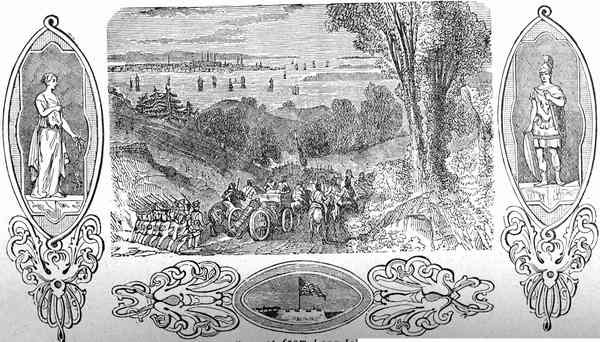
Retreat from Long Island
became sensible that their position was untenable, and a retreat was resolved on; but the execution of that measure presented great difficulties. The East River, nearly a mile broad, and sufficiently deep to float vessels of war, was in their rear; the British had a strong fleet at hand; and the victorious army was in front. Escape seemed impracticable; but in the face of all those difficulties, the Americans, to the number of nine thousand men, with their ammunition, artillery, provisions, horses, and carriages, on the evening of the 29th and morning of the 30th of August, passed over from Brooklyn to New York, without the loss of a man. The retreat took thirteen hours, during part of which time it rained; and, on the morning of the 30th, a thick fog hung over Long Island, and concealed from the British the operations of the Americans, while at New York the atmosphere was perfectly clear. The fog disappeared about half an hour after the American rear-guard had left the Island. Thus, by great exertions and a fortunate combination of circumstances, the American army escaped from the perilous situation in which it had been placed.
